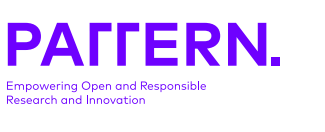
PATTERN (Piloting Open and Responsible Activities and Trainings Towards the Enhancement of Researchers Networks) is a European project promoting Open and Responsible Research and Innovation (Open RRI) through training activities in eight key areas: Open Access, Research Integrity, Management and Leadership, FAIR Data Management, Science Communication, Dissemination and Exploitation of Results, Citizen Science, and Gender, Non-discrimination and Inclusion in Research.
At SISSA, the project is managed by ILAS, the Research and International Relations Office, the Communications Office, and the Valorisation and Innovation Office.
👉 Learn more on https://www.pattern-openresearch.eu/
Upcoming Trainings - Coming Soon
Free online courses for SISSA Students and Posdocs
📅 13 February 2025 | 10:30–12:30 | Online
Communication, Dissemination and Exploitation in Horizon Europe
Organized by APRE and LOBA
Language: English
👉 Registration opening soon
📅 Dates coming soon | Online
Self-paced Science Communication Modules
- Introduction to Science Communication
- Writing for the Media
- Talking with the Media
- Social Media for Scientists
- Communicating with Policymakers
Organized by SISSA
Language: English
👉 Registration opening soon
Contact
For any questions, please contact valorisation@sissa.it for information on how to participate and the registration form, refer to pattern@sissa.it for information about the PATTERN Project and detailed info about the training course
Past Events
Talking with the Media
11 April 2025, 9.30-12.30 | SISSA, Big Meeting Room
By SISSA
The aim of this training is to present some best practices to handle an interview with a journalist. Tips are provided on how to prepare in advance for questions, whether discussing a specific research project or addressing a general topic. Additionally, a series of suggestions are offered to improve performance, respond effectively, and deal with potential challenges.
Communicating with Policymakers
4 April 2025, 9.30-12.30 | SISSA, Big Meeting Room
By SISSA
This module aims at introducing the process of policymaking and its relation to science. It highlights the key difference between scientists and policymakers and offers a tool that can ease the communication between them: the elevator pitch. It is a slightly more advanced since it builds on skills previously acquired when dealing with non-experts.
Social Media for Scientists
28 March 2025, 9.30-12.30 | SISSA, Big Meeting Room
By SISSA
Social media are useful tools for publicising one's research and connecting with other researchers. Digital platforms allow you to reach a wide and interested audience. Each platform, however, has its own rules and objectives. We will analyse generic social media and social media for academia and do exercises to learn how to use them.
Writing for the Media
14 March 2025, 9.30-12.30 | SISSA, Big Meeting Room
By SISSA
This module aims at introducing participants to the media logic and at giving them practical experience in writing texts for the media. This may help them better relate with journalists as well as with their institution’s press officers. Participants will understand when and how science can become news, finding out what are the news values and how to structure texts and select content for this kind of audience.
Introduction to Science Communication
7 March 2025, 9.30-12.30 | SISSA, Big Meeting Room
By SISSA
This module helps participants conceptualise the role of communication in the relationship between science and society. The first part of the course will analyse Science Communication as an action taking place in a social and political context. In the second, more practical, part of the course, participants will reflect on their own practical experiences in this field.
The exploitation of scientific results & On creating actionable knowledge
6 December 2024, 10-13 | Online
Focus: Exploitation of scientific results and IPR. Creating Actionable Knowledge: how to visually pitch your research results.
The Communication, Dissemination and Exploitation in Horizon Europe
26 November 2024, 10-13 | Online
A glossary for Communication, Dissemination and Exploitation in Horizon Europe. Delving into the HE template: Section 2 – Impact. The obligation to communicate, disseminate and exploit. Managing Communication and Dissemination activities in HE projects (including focus on social media, examples of successful CDEPs and Reporting).



